Comics
I haven't been reading many books lately, as I discussed in my last book update. Most of my reading had been limited to graphic novels and comic book compilations.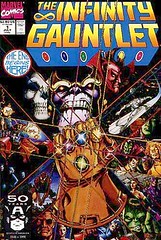
Over the holidays, my officemate Jojo lent me his copy of Jim Starlin's The Infinity Gauntlet. Remember this? Back in grade school in the early '90s, during the Jim Lee/X-Men era when we were all Marvel fans, this was the big cheese, with all significant characters in the Marvel universe taking a shot at (and dying at the hands of) the titan Thanos.
Sure, they all die, but in the end everything goes back to normal and everyone becomes alive again, so nothing really happened. So while it's still a fun read, the fact that there were no real consequences makes the whole thing seem... gimmicky.
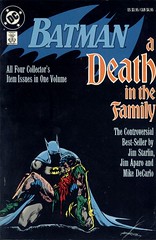 The next graphic novel I read was coincidentally another Jim Starlin book. I got this copy of A Death in the Family from an uncle who was visiting over the holidays. It was the first edition of the story line, the cover was tattered pretty badly, and the pages were printed on cheap newsprint.
The next graphic novel I read was coincidentally another Jim Starlin book. I got this copy of A Death in the Family from an uncle who was visiting over the holidays. It was the first edition of the story line, the cover was tattered pretty badly, and the pages were printed on cheap newsprint.The story itself wasn't so bad. The book is popular among comic book fans because it told the death of Jason Todd, the second Robin. The adventure starts normally enough, giving off the feel of your average superhero romp, with Jason running away to find his real mother and Batman attempting to stop Joker from selling weapons of mass destruction to Arab terrorists.
The book reaches its classic status in the last act, after the death of Jason Todd, as Batman contemplates revenge on Joker. There are a couple of surprise twists near the end, which includes the identity of the person who ultimately stops Batman from committing murder.
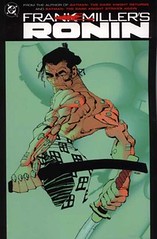
Frank Miller worked on Ronin before he wrote the classic The Dark Knight Returns. Like DKR, it is set in a bleak future and features the same "dark and gritty" style he used in DKR. The storyline reads very similar to Samurai Jack, as it tells the story of a ronin, cursed with immortality until he defeats his demon nemesis, being resurrected in the future. Of course, everything is not what it seems.
While the story certainly was no DKR (not even close really), I actually liked Miller's artwork more here than it that one.
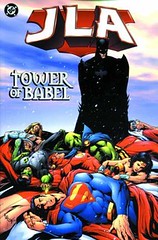
Speaking of the Dark Knight, Batman starred in the next book I read, Mark Waid's JLA: Tower of Babel. Since kicking Superman's ass in DKR, comic book fans have held the belief that Batman can beat any other superhero. This book runs with that idea, as Batman keeps secret files on every member of the League, in case any of them became threats and needed to be neutralized. Unfortunately, the files are stolen by Ra's Al-Ghul's gang, and one-by-one the League's members are taken down.
The storyline is really cool, but reading the book, I was a bit disappointed because it didn't feel as epic as it should have been. Rather, the whole thing played out like a multi-part episode of the Justice League Unlimited animated series. Not that I'm saying that it wasn't good, because it was very, very good. But it could have been great.
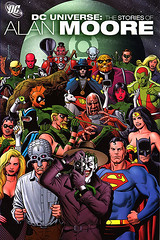 Speaking of the JLU series, the episode For the Man Who Has Everything (one of the series' best) was adapted from a story included in DC Universe: The Collected Stories of Alan Moore.
Speaking of the JLU series, the episode For the Man Who Has Everything (one of the series' best) was adapted from a story included in DC Universe: The Collected Stories of Alan Moore.The gem of the collection is the classic story The Killing Joke, depicting Joker at his most psychotic, as he puts a bullet through the spine of Barbara Gordon (the former Batgirl, now Oracle) and turns her into a paraplegic, before he uses Commissioner Gordon into a sex slave. Aside from serving up an account of Joker's origin, the story works as a deconstruction of Batman and Joker's relationship, as well as the relationships of heroes and villains in the comic book universe in general.
But for someone who had previously only read Moore's longer work (Watchmen, V for Vendetta), the collection for me only affirmed Moore's genius further. I was surprised by the depth, versatility, and talent he was able to show in such a limited space, especially with the diversity of the characters he worked with (Superman, Batman, obscure Green Lantern Corps members, Green Arrow, Vigilante etc.) It was not at all unlike reading a short story collection of a master novelist. Shorter, definitely, but no less brilliant.
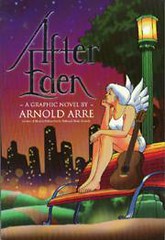 I read Arnold Arre's After Eden a couple of years ago, but I only bought a copy only two weeks ago, when I was in Gateway after watching my favorite basketball team lose a Finals game at the Araneta. Anyway, it was still everything I remember it to be.
I read Arnold Arre's After Eden a couple of years ago, but I only bought a copy only two weeks ago, when I was in Gateway after watching my favorite basketball team lose a Finals game at the Araneta. Anyway, it was still everything I remember it to be.It's corny. It's mushy. It's goes for a lot of cheap laughs and "kilig" moments. It's storyline is straight out of a Star-Cinema-presents-Bea-Alonzo-John-Lloyd-Cruz romantic comedy.
I like it.
It's the perfect gift for any person who's ever been in love with a geek.
jae, pahiram! hehe
I bought a copy of Marvels yesterday, I was intrigued by the idea of showing the Marvel universe through the eyes (or lens i guess) of a photographer (plus I love Alex Ross' artwork, especially in kingdom come). It was ok, you really get a sense of how helpless and insignificant you feel with all those super-people running about. But in the end, I really just wanted to see more superheroes drawn (or painted) by Alex Ross, which wasn't the case here since the heroes just have glorified cameos (great cameos at that).
weird ako, di ko trip ung art ni alex ross.. or rather, hindi ko gusto ung art nya pag sa comics (pero ok lang kung sa portraits).
aj,
i'll probably get me a copy of the long halloween next.
leks,
sige pag nagkita tayo
Grade school, early nineties eh?
And hella gimmicky for sure. While waiting for the next month for the next issue, there I was thinking Marvel'd redo EVERYTHING since a lotta their guys supposedly died.
Like you said, gimmicky LOL!



